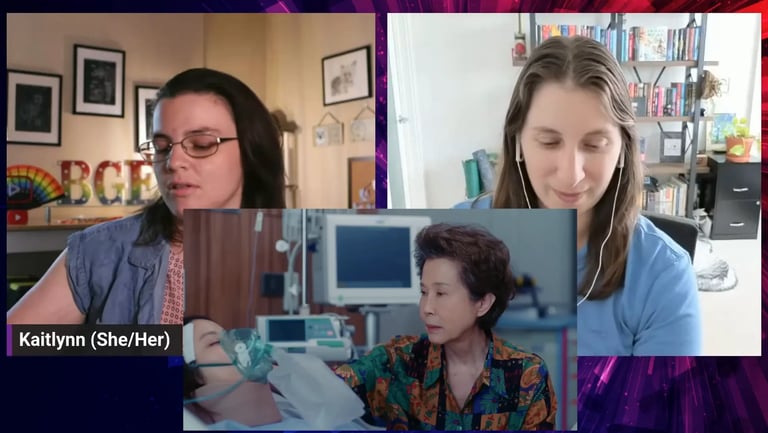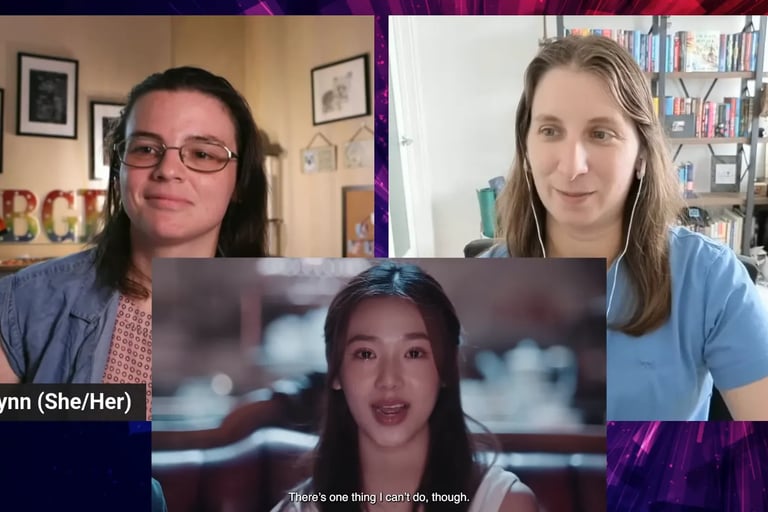Pluto the Series Ep 6 Recap Pt 2: Pity Party
Pluto the Series Ep 6 Pt 2 recap: a deep scene-by-scene look at May and Ai's emotional pivot — Meemaw's small gestures, the bedroom hug, and behind-the-scenes notes.
DISCUSSIONTHAI GLTVPLUTO THE SERIESNAMTAMFILM
Big Gay Energy
8/30/20256 min read
Ai’s morning: care, guilt, and the unread text
The episode opens quietly with Ai descending the stairs to find a breakfast that isn’t just eggs. Meemaw leaves a note explaining she took Ai’s soup to the shrine so Ai could have a day off. That one visual, a bowl with vegetables added, reads as both apology and appreciation. It is Meemaw’s attempt to give back and to acknowledge all Ai has been carrying.
Ai’s phone charges, and a message from May lights up the screen. Ai leaves it unread. We talked about this on the episode, and we still stand by the assessment that Ai retreats into silence because that is her default coping mechanism. She is not trying to be cold. She is trying not to be overwhelmed. The juxtaposition between Ai’s home morning and May’s professional, clinical morning is cruelly effective. Ai’s space centers warmth and human mess. May’s space centers efficiency and a kind of loneliness that polite people do not talk about out loud.
the unannounced visit and that practiced hug
Ai shows up at May’s door because she needs to be held. Ai often defaults to silence, but here she chooses proximity. When she says May’s name it is tentative, and when May recognizes her voice, the scene instantly becomes tender.
May cannot see Ai, but the way she responds to the hug proves that she already understands Ai’s nonverbal language. We mentioned in the episode that this hug looks like a lifeline and that there is BTS of Namtan and Film workshopping it. It is not a casual on-screen embrace. Ai buries herself, using as much of her body as possible to be supported. That physicality sells Ai’s need better than any line could.
There is power in the silence. May strokes Ai’s shoulder instead of interrupting. She lets Ai’s breathing slow. The decision to let this quiet moment run is deliberate. The show trusts its actors to hold space, and the camera respects that trust by staying close, by letting us feel the small changes in body language. The emotional payoff is huge because it is earned through touch and attention rather than exposition.
Candles, composition, and camera choices
We noticed the small visual motifs the episode repeats. There are several rack focuses on candles and a deliberate usage of reflection shots whenever Ai is emotionally off-balance. The tilted angle when Ai confesses she has a little sister is a particularly smart editorial choice. The camera goes off-axis and a reflective surface interrupts the composition, visually showing Ai’s inner destabilization.
When Ai looks small in the frame, May’s presence becomes a literal enlarging force. May’s hand on Ai’s shoulder is a constant, gentle reassurance. The cinematography uses scale to communicate emotional change: Ai grows into the frame as she connects with May, and the motif reinforces the narrative line May is building Ai up.
Ai tells pieces of truth and keeps some hidden
Ai attempts to talk about her life and about Oom. She slips sometimes. She is supposed to be Oom, but the truth slips out — and she corrects herself clumsily. We teased Ai about how she is a terrible spy. It is funny because it is accurate. She is not intentionally giving things away. She is in her feelings and she is human, and that makes the slips believable. From May’s vantage, this is new information. May is learning that Ai is a caretaker, that Ai delayed graduation to support the family, and that there are quieter forms of heroism at play in Ai’s life.
Hospital scenes: the aftermath and the cruelty of May’s friends
Switching gears, the episode takes us to the hospital where Meemaw and Oom are. Meemaw’s line about how her good granddaughters can hurt so much is one of those sad human truths we keep thinking about. The twins fit the mold Meemaw had imagined, yet the fallout from secrets forced Meemaw to reassess everything she thought she knew. It is a painful parent moment that reads as both regret and reluctant understanding.
Ai shows up and helps Meemaw with Oom’s arms like they always do. This small choreography of caregiving is their language. Ai’s conversation with Oom is directed to Meemaw. They cannot talk directly, so they speak through Oom, who cannot respond. It is funny and heartbreaking in equal measure, and the editing cues underline that: the shot shifts from one point of view to another, subtly indicating whose ears these words are intended for.
Ploy, Ton, and the complicated friend-ex dynamics
Ploy is a puzzle. She tells Ai that May does not want pity. A few scenes later Ploy will behave in ways that complicate her integrity. We keep asking if Ploy understands what she is saying in the moment. She has a history with Ton and with May, and resentments stick like burrs. Ton chases Ploy and tries to soothe her, showing us that their past is not uncomplicated. He loves her in ways he cannot abandon. Ploy pushes back, accusing him of just doing what May told him to do, but Ton’s answer is soft and sincere, showing he still cares. Their unresolved past is one of the subtle side stories the episode layers into the main arc.
The lounge date: a small place that means a lot
Ai takes May to an odd hybrid lounge, half tea house, half live music room. It feels like a curated second-best gift. May explains, in the gentlest terms, why that uncertain space is meaningful. She says that the musicians that inspired her work in America played music like this. They made her feel safe. For May, being there post-accident is not about nostalgia. It is about an anchor, a place where she can be who she is now and not have to carry the weight of her past selves.
Ai asks May how the place looks and describes it as nice, unique, and classic. It is textbook Ai to double-meaning the description and implicitly describe May. The parallel is intentional. Ai’s perspective becomes a tool for May: listening to Ai describe the world allows May to experience it through someone who cares.
May’s truth about pity and the hospital flashback
What hits hardest in this scene is May’s confession that she hates being pitied. Hate is a strong word. The vulnerability we get in the café is not just personal pain. It is a professional and existential wound. May has built a life on being competent and admired. She is terrified that blindness will reduce all of that to sympathy. That fear drives her refusal to go to Ploy’s event and complicates every interaction she has going forward.
The episode gives us a flashback that contextualizes this fear. After the assault, May wakes in the hospital and experiences a moment of utter panic. Film’s performance here is aggressive and raw. May cannot orient herself. She flails and the camera places us in that disorientation with her. Then friends show up and act like everything should be fine. They assume because someone lost a sense, the others must be able to compensate. They demand recognition, and they act wounded that May cannot immediately meet their expectations. That sequence is trauma layered over humiliation. It makes the present-day fear of pity comprehensible.
Acting, music, and editing that make this episode sing
Two notes that we cannot skip over. One, the acting. Film’s hovering tears and control of the face in the hospital-to-present sequences are nuanced and devastating. Namtan’s reaction work is as strong. Neither actor needs excessive dialogue. They tell us everything with hands and a fingertip next to a jawline. Those small physical choices are the bones of the episode.
Two, the music choices. The episode leans on OST cues like the piece that plays during Ai opening up and the dreamier track that underscores May’s new aspirations. The musical decisions signal emotional shifts and guide how we as viewers should receive each beat. That soundtrack, combined with the slow editing, allows quiet moments to land like knockout punches.


Challenge for you
We talked in the episode about dreams because this installment highlights multiple characters’ dreams, both realized and deferred. What is your dream, if you are comfortable sharing? If you do not want to share what you are working toward now, what did you want to be as a child? Let us know in the comments!






